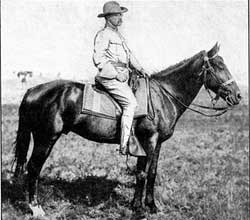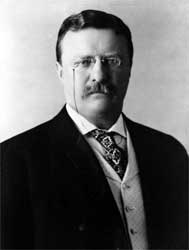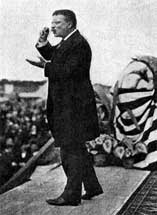| Theodore Roosevelt became the 26th US President (1901-1909) after the assassination of President William McKinley. Nicknamed Teddy, he was one of the most popular and important Presidents ever to serve in the Chief Executive Office. A hero in Cuba during the Spanish-American War, his foreign policy was summed up in the phrase "Speak softly and carry a big stick." The Panama Canal was built during his tenure in the White House.

Roosevelt was born on October 27, 1858 into a prosperous Dutch New York City family. As a child he was sickly, suffering from asthma and poor eyesight. He exercised vigorously to improve his health and increase his body strength. He was a man of hearty enthusiasm and was devoted to physical fitness. When he was pleased he would say "Bully!" Roosevelt enjoyed big game hunting, and toy makers created the teddy bear after a cartoonist drew Roosevelt with a bear cub. His hunting produced a unique collection of animals that he donated to the Smithsonian Institute.
Teddy Roosevelt was also an author. Between 1880 and 1900 he wrote more than a dozen books, the best known of which is "The Winning of the West", which was published in four volumes. Teddy was much loved by the public, and he thoroughly enjoyed his presidency. Upon leaving office, he said, "I do not believe that anyone else has ever enjoyed the White House as much as I have."

 Theodore Roosevelt's first taste of politics came when was elected to the New York State Assembly in 1882. In 1884, bereaved by the deaths of his mother and his wife, Alice Hathaway Lee (who died giving birth to a daughter who did survive), he left New York and retired to his ranch in the Dakota Territory. He spent the next two years ranching and hunting for big game. Theodore Roosevelt's first taste of politics came when was elected to the New York State Assembly in 1882. In 1884, bereaved by the deaths of his mother and his wife, Alice Hathaway Lee (who died giving birth to a daughter who did survive), he left New York and retired to his ranch in the Dakota Territory. He spent the next two years ranching and hunting for big game.
In 1886, Roosevelt both remarried and reentered politics. After an unsuccessful campaign in 1886 for mayor of New York City and a failed bid to get on the national Republican ticket in 1888, he was finally, in 1889, appointed United States Civil Service Commissioner. He was re-appointed in 1893. From 1895 to 1897, he served as New York City's police commissioner. In 1887 he met and subsequently married Edith Carow.
In 1896, Roosevelt had once again tried and failed to get a spot on the national Republican ticket. McKinley won that election and appointed Roosevelt Assistant Secretary of the Navy, where "TR", as he was called, worked to broaden and upgrade the service. In 1898, Roosevelt, along with physician and soldier Leonard Wood, formed the Rough Riders. The Rough Riders' victory at the Battle of San Juan Hill in Cuba made Roosevelt a popular national figure. After that (in 1899), he was elected governor of New York. As governor he followed his own mind and heart above the wishes of the Republican Party. Nevertheless, in 1901, Theodore Roosevelt became William McKinley's Vice President; and when McKinley was assassinated in September of that year, Roosevelt assumed the presidency. At the age of forty-three, Theodore Roosevelt was the youngest man to ever become President of the United States.

 As President, Roosevelt took a moral approach toward the nation's social problems. He used his Presidential powers as none before him had. He handled the coal miners strike of 1902 by appointing a commission to investigate. As President, Roosevelt took a moral approach toward the nation's social problems. He used his Presidential powers as none before him had. He handled the coal miners strike of 1902 by appointing a commission to investigate.
The Sooner Act of 1902 was drafted to gain the right to build a canal to create a shipping route through what is now Panama, but what then was part of Columbia. Columbia refused to ratify The Sooner Act, but a new Panamanian government was established in 1903, which did pass it. Having gained the right to build the Panama Canal, The United States began construction immediately. Also in 1903, the United States won a dispute with Great Britain over the boundary between lower Alaska and Canada. Teddy Roosevelt was able to keep the Germans from interfering with Venezuela in 1902, and he declared that only the U. S. had the right to intervene in South American affairs.
During his administration Theodore Roosevelt initiated forty lawsuits against big trusts and initiated measures for the conservation of national resources. He had 125 million acres set aside as National Forests. Later he added another 85 million acres in Alaska and the Pacific Northwest.
Roosevelt was reelected to the presidency in 1904 with ease. In that year The Roosevelt Corollary, stating that the United States had "police power" over Latin America, was added to the Monroe Doctrine. Roosevelt's second term was also noted for the Hepburn Act of 1906 and the Pure Food and Drug Act of 1906. The Hepburn Act strengthened the Interstate Commerce Commission (ICC) and prevented the railroad from charging unjust rates. The Pure Food and Drug Act of 1906 established the Food and Drug Administration.
 Also in 1906 Theodore Roosevelt was the first American to win the Nobel Peace Prize when his mediation in the Russo-Japanese War led to The Treaty of Portsmouth, which ended the war between Russia and Japan. He also helped to settle a conflict between Germany and France over control of Morocco. When several international crises arose between 1904 and 1906, Roosevelt was key in keeping the balance of European power intact. Also in 1906 Theodore Roosevelt was the first American to win the Nobel Peace Prize when his mediation in the Russo-Japanese War led to The Treaty of Portsmouth, which ended the war between Russia and Japan. He also helped to settle a conflict between Germany and France over control of Morocco. When several international crises arose between 1904 and 1906, Roosevelt was key in keeping the balance of European power intact.
During both terms of his presidency, Roosevelt fought to broaden and upgrade the Navy and other armed forces. He got Congress to agree to build more battleships and cruisers. In 1907 he sent the battle forces on a world tour to show off United States naval ability. This impressed the Japanese so that Taft was able to negotiate agreements with them that settled the dispute over immigration. In his last public appearance as President, Roosevelt inspected the naval fleet when it returned from its world tour.

Upon leaving the White House, Teddy Roosevelt left politics for four years, returning in 1912 when he split the Republican Party by running as the third party Progressive candidate. During this campaign, while in Milwaukee Wisconsin, Roosevelt was shot in an assassination attempt; but he went ahead and gave his speeches before going to the hospital. He brushed off the attack saying, "It takes more than that to kill a bull moose." From that time on, the Progressive Party became known as the Bull Moose Party. Roosevelt lost that election to Woodrow Wilson. In 1914, while in the Amazon, Teddy Roosevelt caught tropical fevers. On January 6, 1919, he died in his sleep in Oyster Bay, N.Y. His failing health did not prevent him from remaining active until the very end of his life.
|

